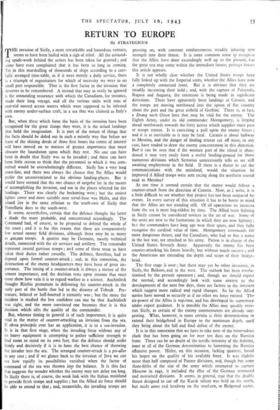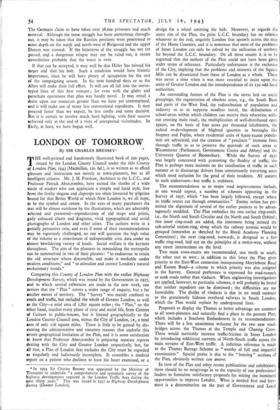RETURN TO EUROPE
By STRATEGICUS But, when these which form the basis of the invasion have been recognised for the great things they were, it is the actual landings that hold the imagination. It is part of the nature of things that the facts should be doled out in such a miserly way that before we learn of the shining deeds of those first hours the centre of interest will have moved on to matters of greater importance that must obscure the foundation upon which they rest. No one can have been in doubt that Sicily was to be invaded ; and there can have been little reason to think that the personnel to which it was com- mitted would be overwhelmingly different. Sicily has a very long coast-line, and there was always the chance that fhe Allies would prefer the unconventional to the obvious landing-places. But it would have seemed that the one chance of surprise lay in the means of accomplishing the invasion, and not in the places selected for the landings. There was clearly the beckoning west ; but the easiest fighter cover and most suitable near naval-base was Malta, and this island lies in the same relation to the south-east of Sicily that Pantellaria does to the south-west.
It seems, nevertheless, certain that the defence thought the latter a shade the more probable, and concentrated accordingly. The Command had, of course, to be prepared to defend the whole of the coast ; and it is for this reason that there are comparatively few actual enemy field divisions, although there may be as many as 400,000 troops. A quarter may be Germans, mostly technical details, connected with the air services and artillery. The remainder represent coastal garrison troops ; and some of these seem to have taken their duties rather casually. The defence, therefore, had to depend upon formal counter-attack ; and, • in this connexion, the destruction of the enemy headquarters may have been of great im- portance. The timing of a counter-attack is always a matter of the utmost importance, and the decision rests upon reasons that once more show how vain it is to regard warfare as a science. Auchinleck thought Ritchie premature in delivering his counter-attack in the early part of the battle that led to the disaster of Tobruk. Pre- mature, belated or half-hearted it certainly was ; but the more the incident is studied the less confident can one be that Auchinleck was right, and the more convinced one becomes that it is this decision which sifts the quality of the commander.
But, whereas timing in general is of such importance, it is quite vital in the matter of counter-attacking an invasion from the sea. If obsta principiis ever has an application, it is to a sea-invasion. It is in that first stage, when the invading force without any of its heavy equipment is attempting to gather sufficient strength to find room to stand on its own feet, that the defence should strike firmly and decisively if it is to have the best chance of throwing the invader into the sea. The arranged counter-attack is a pis-alter in any case ; and if we glance back to the invasion of Java we can see how rapidly its possibilities vanished when the factor of command of the sea was thrown into the balance. It is this fact that suggests the wonder whether the enemy may not delay too long. In Sicily there is, of course, the weak link with the Italian mainland to provide fresh troops and supplies ; but the Allied air force should be able to attend to that ; and, meanwhile, the invading troops are
pressing on, with constant reinforcements steadily infusing new strength into their thrust. It is mere common sense to recognise that the Allies have done exceedingly well up to the present, but the great test may come within the immediate future, perhaps betore this article appears.
It is not wholly clear whether the United States troops have fully linked up with the Imperial units, whether the Allies have now a completely connected front. But it is obvious that they are steadily increasing their hold ; and, with the capture of Palazzolo, Ragusa and Augusta, the extension is being made in significant directions. There have apparently been landings at Catania, and the troops are moving northward into the spoon of flat country about the port and the great airfield of Gerbini. There is, in fact, a Drang each Osten here that may be vital for the enemy. The Eighth Army, under its old commander Montgomery, is forging ahead northwards towards the ferry across which supplies must pass or troops retreat. It is exercising a pull upon the enemy forces ; and it is as inevitable as it may be fatal. Catania is about halfway to Messina, and the danger of finding retreat cut off must, in any case, have tended to draw the enemy concentration in this direction. But' it can be seen that if the western part of the island is aban- doned it may very easily form a useful landing-ground for those numerous divisions which Sertorius unnecessarily tells us arc still awaiting employment in the field. If there is a threat to cut the communications with the mainland, would the situation be improved if Allied troops were sent racing along the northern coastal road to Messina?
At one time it seemed certain that the ehemy would deliver a counter-attack from the direction of Catania. Now, as I write, it is a little difficult to see whether that project has-not been outpaced by events. In every survey of this situation it has to be borne in mind that the Allies are not standing still. Of all operations an invasion from the sea is most hag-ridden by time. The Allied team fighting in Sicily cannot be considered novices in the art of war. Some of the units are new to the formations in which they are now fighting ; but the commanders have long ago won their spurs, and they fully recognise the cardinal value of time. Montgomery commands the more dangerous thrust, and the Canadians, who had so fine a name in the last war, are attached to his army. Patton is in charge of the United States- Seventh Army. Apparently the enemy has been counter-attacking his forces heavily, but without much success ; and the Americans are extending the depth and scope of their bridge- head.
The first stage is over ; but there may yet be other invasions, in Sicily, the Balkans, and in the west. The outlook has been revolu- tionised by the present operation ; and, though we should expect the normal, and accordingly look with some anxiety to the developments of the next few days, there are factors in the invasion which suggest more radical and rapid changes. So far the Allied navies have moved as securely as if no other sea force existed. The air-power of the Allies is supreme, and has developed its supremacy under expert guidance. It is possible the Allies may quickly over- run Sicily, as certain of the enemy commentators are already sug- gesting. 'What, however, is more certain is their determination to extend their bridgehead in Europe to the maximum depth, until they bring about the full and final defeat of the enemy.
It is in this connexion that we have to take note of the tremendous clash that has been going on for over ten days on the Russian front. There can be no doubt of the terrific intensity of the fighting, none at all of the German determination to hamstring the Russian offensive power. Hitler, on this occasion, lacking quantity, based his hopes on the quality of his available force. It was slightly more than half composed of Panzer divisions, and, though but some three-fifths of the size of the army which attempted to capture Moscow in 1941, it included the elite of the German armoured and motorised divisions. It seems, in general, true that the double thrust designed to cut off the Kursk salient was held on the north, but made some real headway on the southern, or Bielgorod sector. The Germans claim to have taken over 28,000 prisoners and much material. Although the tense struggle has been anonymous through- out, it may be taken that the Russian positions were penetrated to some depth on the north and north-west of Bielgorod and the upper Donetz was crossed. If the bitterness of the struggle has not yet passed, and a dangerous relapse may not be ruled out, it seems nevertheless probable that the worst is over.
If that can be accepted, it may well be that Hitler has missed his target and shot his bolt. Such a condition would have historic importance, since he will have plenty of occupation for the rest of the campaigning season. In the next hundred days or so the Allies will make their full effort. It will not all fall into the stereo- typed lines of this first venture ; for even with the glider and parachute operations that plan was hardly novel. It may entail a drain upon our resources greater than we have yet contemplated, and it will make use of many less conventional expedients. It may proceed faster than we expect, be less costly and more decisive. But it is certain to involve much hard fighting, with final success achieved only at the end of a vista of unexpected vicissitudes. In Sicily, at least, we have begun well.



























 Previous page
Previous page